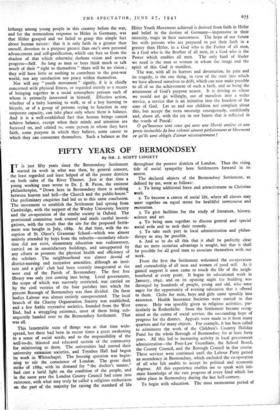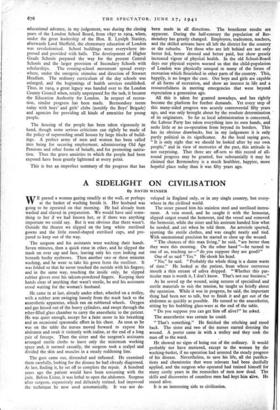FIFTY YEARS OF BERMONDSEY
By DR. J. SCOTT LIDGETT
IT is just fifty years since the Bermondsey Settlement started its work in what was then, by general consent, the least regarded and least helped of all the poorer districts on both sides of the River Thames. Just at that time a yOung working man wrote to Dr. J. B. Paton, the eminent philanthropist, " Down here in Bermondsey there is nothing between heaven and hell—the Church and the public-house." Our preliminary enquiries had led us to this same conclusion. The movement to establish the Settlement had sprung from Cambridge, with the support of the Wesley University Society and the co-operation of the similar society in Oxford. The provisional committee took counsel and made careful investi- gations, with the result that the site for the proposed Settle- ment was bought in July, 1889. At that time, with the ex- ception of St. Olave's Grammar School—which was almost entirely attended by boys from the suburbs—secondary educa- tion did not exist, elementary education was rudimentary, carried on in unsatisfactory buildings, and unsupported by any efforts to promote the physical health and efficiency of the scholars. The neighbourhood was almost devoid of district-nursing and recreative amenities, although an insti- tute and a girls' club had been recently inaugurated at the west end of the Parish of Bermondsey. The first free library was only just coming into being. Local government, the scope of which was narrowly restricted, was carried on by the civil vestries of the four parishes into which the present Borough of Bermondsey was then divided. On these bodies Labour was almost entirely unrepresented. The local branch of the Charity Organisation Society was established, and a few feeble recreative societies, founded from the West End, had a struggling existence, most of them being sub- sequently handed over to the Bermondsey Settlement. That was all.
This lamentable state of things was at that time wide- spread, but there had been in recent times a great awakening to a sense of social needs, and to the responsibility of the well-to-do, leisured and educated section of the community for ministering to them. The universities had started their university extension societies, and Toynbee Hall had begun its work in Whitechapel. The housing question was begin- ning to stir the conscience of London. The great dock strike of 1889, with its demand for " the docker's tanner," had cast a lurid light on the condition of the people, and in the same year the London County Council had come into existence, with what may truly be called a religious enthusiasm on the part of the majority for raising the standard of life throughout the poorest districts of London. Thus the rising tide of social sympathy bore Settlements forward in its course.
The declared objects of the Bermondsey Settlement, as defined by me, were as follows: 1. To bring additional force and attractiveness to Christian work.
2. To become a centre of social life, where all classes may meet together on equal terms for healthful intercourse and recreation.
3. To give facilities for the study of literature, history, science and art.
4. To bring men together to discuss general and special social evils and to seek their remedy.
5. To take such part in local administration and philan- thropy as may be possible.
6. And so to do all this that it shall be perfectly clear that no mere sectarian advantage is sought, but that it shall be possible for all good men to associate themselves with our work.
From the first the Settlement welcomed the co-operation and comradeship of all men and women of good will. As it gained support it soon came to touch the life of the neigh- bourhood at every point. It began its educational work in January, 1892, and on its opening night the building was thronged by hundreds of people, young and old, who were eager for the opportunity of evening education that it offered to them. Clubs for men, boys and girls came speedily into existence. Health Insurance Societies were started in due course. Help was speedily given to religious activities, par- ticularly in Rotherhithe. Soon the Settlement became recog- nised as the centre of social service, the outstanding hope of progress for the district. Appeals were made to it from many quarters and for many objects. For example, it has been called to administer the work of the Children's Country Holiday Fund for the whole Borough of Bermondsey for at least forty years. All this led to increasing activity in local government administration—the Poor-Law Guardians, the School Board, the County Council, and the Borough Council in due course. These services were continued until the Labour Party gained an ascendency in Bermondsey, which excluded the co-operation of all who felt unable to accept its political and economic dogmas. All this experience enables me to speak with inti- mate knowledge of the vast progress of every kind which has taken place in Bermondsey during the last half-century.
To begin with education. The most momentous period of educational advance, in my judgement, was during the closing years of the London School Board, from 1897 to 1904, when, under the great leadership of the Hon. E. Lyulph Stanley, afterwards Lord Sheffield, the elementary education of London was revolutionised. School buildings were everywhere im- proved and provided with halls. The development of Higher Grade Schools prepared the way for the present Central Schools and the larger provision of Secondary Schools with scholarships. The evening-school movement spread every- where, under the energetic stimulus and direction of Stewart Headlam. The ordinary curriculum of the day schools was enlarged, and the beginnings of health services established. Thus, in 1904, a great legacy was handed over to the London County Council when, totally unprepared for the task, it became the Education Authority for London. In respect of recrea- tion, similar progress has been made. Bermondsey teems today with boys' and girls' clubs (notably the Boys' Brigade) and agencies for providing all kinds of amenities for young people.
The housing of the people has been taken vigorously in hand, though some serious criticisms can rightly be made of the policy of superseding small houses by large blocks of build- ings. A perfect army of men and women has been called into being for securing employment, administering Old Age Pensions and other forms of benefit, and for promoting sanita- tion. Thus the grave anxieties to which the people had been exposed have been greatly lightened at every point.
This is but an imperfect summary of the progress that has been made in all directions. The beneficent results are apparent. During the half-century the population of Ber- mondsey has greatly changed. Employers, tradesmen, teachers, and the skilled artisans have all left the district for the country or the suburbs. Yet those who are left behind are not only better fed, better dressed and better paid, but show greatly increased vigour of physical health. In the old School-Board days our physical experts warned us that the child-population of London was physically unequal to many of the forms of recreation which flourished in other parts of the country. This, happily, is no longer the case. Our boys and girls are capable of all forms of recreation, and show an interest in life and a resourcefulness in meeting emergencies that were beyond expectation a generation ago.
All this is taken for granted nowadays, and has rightly become the platform for further demands. Yet every step of this many-sided progress was acutely controversial fifty years ago, and was only brought about by the resolute determination of its originators. So far as local administration is concerned, the Labour Party has taken everything into its own hands, and seeks little or no co-operation from beyond its borders. This has its obvious drawbacks, but in my judgement it is only partly political in its significance. As the local saying goes, " It is only right that we should be looked after by our own people," and in view of memories of the past, this attitude is not surprising. That there are off-sets to this record of all- round progress may he granted, but substantially it may be claimed that Bermondsey is a much healthier, happier, more hopeful place today than it was fifty years ago.























 Previous page
Previous page